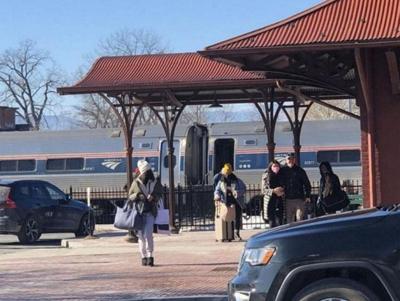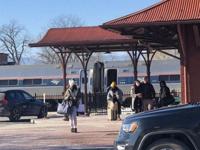New York’s moderate Republican representatives derailed a transportation funding bill last week over concerns about cuts proposed for the national rail carrier Amtrak, another example of the four moderates bucking their party.
Hudson Valley Representatives Mike V. Lawler, R-17 River and Marcus J. Molinaro, R-19, as well as Long Island Reps. Anthony P. D’Esposito, R-4, Park and Nicholas J. LaLota, R-1, all said they would not support the GOP-crafted spending bill for infrastructure for the current fiscal year.
In remarks to the media last week, all four men said they wanted to see Amtrak funded appropriately to maintain service, which supports a significant number of jobs and economic connections across the Hudson Valley and New York.
The House has been late in passing the large appropriations bills that combine to create the federal budget this year. The legislation is typically due by the Oct. 1, but Congress has historically blown through that deadline and this year is no different. The infrastructure appropriations bill funds interstate spending, Amtrak funding and the grant programs that help states run their own highways, bridges and tunnels.
The Republican-led appropriations bill that was due to be considered last week included a 65% funding cut for Amtrak, which Amtrak CEO Stephen J. Gardner said would be devastating to passenger rail service across the country.
“Funding levels proposed in the House fiscal year 2024 transportation appropriations bill for Amtrak and (Federal Railroad Administration) rail programs will stop the advancement of passenger rail in its tracks,” he said in a statement in July, after the bill was approved by the House Appropriations Committee.
The decreased funding would necessitate cuts to all of Amtraks operations, from long-distance trains connecting the major cities to the Northeast Corridor, the busiest passenger rail line in the country that connects the Eastern seaboard and parts of upstate New York, he said. In additions, state-supported services, including the Empire Service connecting Niagara Falls and Buffalo through to Syracuse, Albany and New York City would see cuts, dramatically dialing back the viability of the national passenger rail network.
Amtrak generally takes in about $2 billion in federal subsidies each year used to fund its daily operations. The appropriations bill tabled last week was set to give the publicly owned company $867 million or less than the $2 billion it typically receives in federal funding. Some Republicans have cited the historic $4.4 billion the company received last year from the Infrastructure Investment and Jobs Act that provided billions in federal funding for infrastructure development nationwide. The House Transportation Appropriations subcommittee, in a summary of its decisions, described Amtrak spending as “wasteful,” and said the company should rely on the money it already has, and try to balance its books with service cuts and price hikes.
Gardner pointed out that money from the Infrastructure Investment and Jobs Act were targeted to help the company expand, and comes with many restrictions on use that would prevent the company from using it to fund daily operations.
“Amtrak’s IIJA funds can primarily be used only for major infrastructure projects and equipment procurement, not the basic maintenance, operations and routine day-to-day expenditures supported by our annual appropriations,” he said.
New York’s moderate Republicans, all representing regions with Amtrak stations or other rail systems connected to Amtrak, said they would not support those cuts. And with the razor-thin Republican majority in the House, those four votes meant the bill likely wouldn’t pass. The bill was scrubbed from the House calendar midway through last week, pending an update that would make the moderates willing to support it.
The GOP infrastructure funding bill also includes a proposal that would end the congestion pricing program in downtown Manhattan, which charges drivers an additional toll to enter the busiest part of New York City. Republicans, especially those representing districts suburban to NYC, have railed against that proposal as an extra tax on their constituents.
Any spending bill passed by the House needs approval from the Democrat-led Senate and President Joseph R. Biden, who last week pledged to veto any bill that includes major cuts to Amtrak.
Biden announced Monday he was advancing $16.4 billion into the Northeast Corridor rail lines, funding 25 passenger rail projects using money appropriated in the Infrastructure Investment and Jobs Act.
On the lines connecting Boston to Washington D.C., running through Connecticut and New York City, some of the money will go to fixing the Gateway tunnel under the Hudson, connecting New York to New Jersey, that remains damaged over a decade after Hurricane Sandy slammed the New York City in 2012.
In his remarks announcing the investment Monday in Wilmington, Delaware, Biden criticized the Republican House budget cut for Amtrak.
“They’re trying to make it slower, and less safe,” he said. “We’re not going to let them stop the progress we’re making.”









